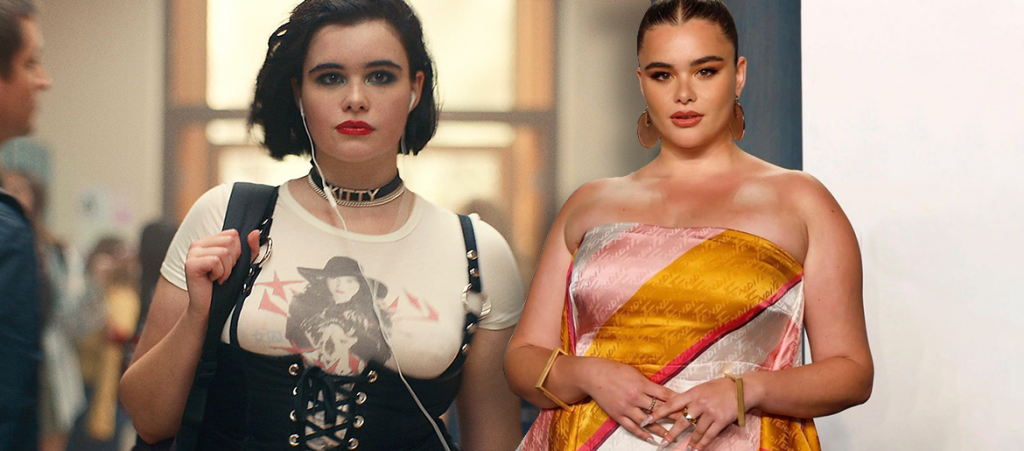
Five months ago, news swirled that Euphoria star Barbie Ferreira had clashed with the show’s creator Sam Levinson. Last week, she formally announced she was leaving the show. Whilst Ferreira initially rejected the suggestion there was on-set drama, fans are now left wondering whether her desire to push her character, Kat, beyond stereotypical fat girl storylines was eventually her demise.
Kat Hernandez is now just another diverse character who will never receive the fulfilled character arc they deserved. With the loss of a character included for the sake of size diversity (and an Emmy-winning storyline) and an actor supposedly driven out of a much-loved role because she was willing to push for more, Euphoria is now left showing a standard set of hot, thin bodies.
Tired storylines
“After four years of getting to embody the most special and enigmatic character Kat, I’m having to say a very teary-eyed goodbye,” the actor shared on her Instagram story. While she didn’t share her reasons for leaving, in February the Fluently Forward podcast revealed rumours that the source of the tension was Levinson’s alleged desire to give Kat Hernandez an eating-disorder storyline.
While the industry might think it’s doing the right thing by writing stories that raise awareness about issues marginalised people face, in doing so they often perpetuate the very stereotypes that cause harm. What is a complex and traumatic reality for many becomes a sensationalised and sugar-coated storyline for entertainment purposes.
It’s a tale as old as time. Disabled characters with storylines dedicated to overcoming their struggles. Queer characters with plots focused on fighting homophobia and societal rejection. Fat characters who spend every second of screen time under a dark cloud of eating disorders and body dysmorphia.
‘Diversity pick’ characters are frequently siloed into narratives of struggle and hardship. Fat actors frequently get handed the same character profile: the shame, the eating disorder, the desperate attempts to fit societal standards, the transformation into what an audience will perceive as traditionally attractive.
WTF SAM LEVINSON.
— Madi L (@madilopez__) August 25, 2022
The only plus size rep. of the show whose storyline was greatly built up just to terribly crumble apart and pretty much become an extra due to shitty writing in the second season, is now gone.
KAT HERNANDEZ DESERVED BETTER.
BARBIE FERREIRA DESERVES BETTER. pic.twitter.com/2ffyNiQ524
Popular movies and TV shows so often fail to just show fat characters existing without their weight being the central part of their narrative. Where are the characters who, instead of providing on-screen inspiration porn, are able to represent the innate complexities that come with diverse representation? Where are the fat characters who are allowed to navigate the messiness that falls anywhere but the two extremes of loving yourself or experiencing shame?
It’s why Kat had become such an important and beloved character. In Euphoria‘s first season, she was learning to understand her sexuality and self-expression, navigating relationships, friendships and sex work. Kat wore lingerie-as-clothing, in outfits rarely portrayed on fat bodies (partly because they’re not easily accessible). And she did so because it fit the identity she was exploring, not to fit the trope of being “brave” or “inspirational” to dress that way.
In season two, Kat became a vulnerable character meeting the consequences of her own actions, just like her friends were. Finding herself grappling with social media’s insistent cries to “love yourself!”, Kat reminded viewers the expectations we put on young women to be body confident is heavy and nuanced. In real life, Barbie Ferreira spoke about the pressure she feels from others to take on characters that always loves themselves. The expectations to have a happy, positive, and confident ending only reinforce rigid societal standards.
Uneven opportunities
The eating disorder plot rumours highlights how the entertainment industry views representation. They believe you need to write a fat character overcoming shame or body-issues in order to cast a fat actor, rather than just casting a fat actor in any role.
Reports that companies such as HBO are allegedly “killing off diversity” in pursuit of balanced budgets and a “happy middle-class America” don’t offer much hope of change. Unbelievably, we’re still in a world where production companies are paying famous actors to don fat suits for so-called ‘comedic effect’. The opportunities readily available to thin actors leave others out in the cold. It’s not just about changing the script, but changing who is allowed to read the script in the first place.
As a global industry feeding content to millions of people, especially impressionable young people, it’s the responsibility of those in the writer’s room to consider the narrative they’re selling. Want to teach young fat people there’s nothing wrong with their body? Show them living interesting lives on screen that have nothing to do with their body. Actors outside of socially-dictated size norms don’t exist for the sake of laugh tracks and transformational reveals à la Insatiable.
Euphoria nearly got there. A young, hot, fat character almost had the opportunity to drive a different type of character arc… but instead Kat was allowed to fade into the background because of her refusal to play into the trope.

Comments are closed.